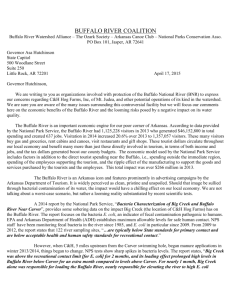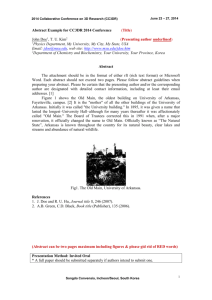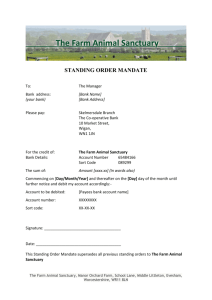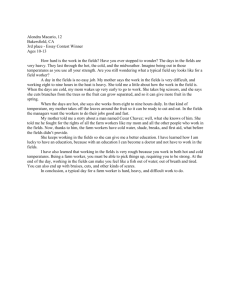Here is a document - Arkansas Farm Bureau
advertisement
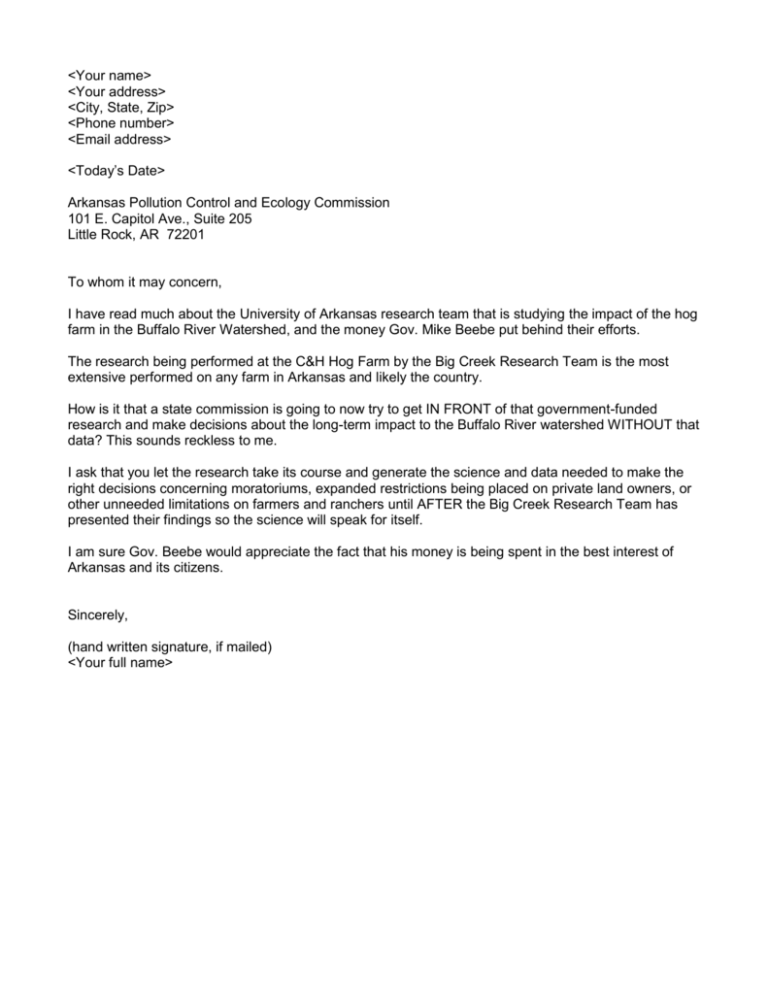
<Your name> <Your address> <City, State, Zip> <Phone number> <Email address> <Today’s Date> Arkansas Pollution Control and Ecology Commission 101 E. Capitol Ave., Suite 205 Little Rock, AR 72201 To whom it may concern, I have read much about the University of Arkansas research team that is studying the impact of the hog farm in the Buffalo River Watershed, and the money Gov. Mike Beebe put behind their efforts. The research being performed at the C&H Hog Farm by the Big Creek Research Team is the most extensive performed on any farm in Arkansas and likely the country. How is it that a state commission is going to now try to get IN FRONT of that government-funded research and make decisions about the long-term impact to the Buffalo River watershed WITHOUT that data? This sounds reckless to me. I ask that you let the research take its course and generate the science and data needed to make the right decisions concerning moratoriums, expanded restrictions being placed on private land owners, or other unneeded limitations on farmers and ranchers until AFTER the Big Creek Research Team has presented their findings so the science will speak for itself. I am sure Gov. Beebe would appreciate the fact that his money is being spent in the best interest of Arkansas and its citizens. Sincerely, (hand written signature, if mailed) <Your full name> <Your name> <Your address> <City, State, Zip> <Phone number> <Email address> <Today’s Date> Arkansas Pollution Control and Ecology Commission 101 E. Capitol Ave., Suite 205 Little Rock, AR 72201 To whom it may concern, I understand the PC&E Commission has cow-towed to the environmental fringe who believes a hog farm 6 miles from the Buffalo River has put the general public in such danger that they are putting a halt to all future farming operations in the entire watershed, including those operating on private, not public, lands. If you are looking for the source of any manure that makes its way into the Buffalo River, I would suggest you spend more time looking at the native species roaming free, unconfined, in the watershed, such as elk, deer, raccoons, possums, and, yes, wild hogs. These animals not only leave droppings and waste in the watershed, they have the freedom to do it while standing in the Buffalo River. How is it that something so obvious can escape the outrage of the environmental stewards who are now raising such a stink over confined hogs in the Buffalo? These people are misguided, and the PC&E Commission is being misled by them. I ask you to stand up for common sense and what is right. Sincerely, (hand written signature, if mailed) <Your full name> <Your name> <Your address> <City, State, Zip> <Phone number> <Email address> <Today’s Date> Arkansas Pollution Control and Ecology Commission 101 E. Capitol Ave., Suite 205 Little Rock, AR 72201 To whom it may concern, As a group that embraces science at the core of its everyday function – to protect the water-quality and environmental resources of the state of Arkansas – it is amazing to me that the commissioners of the PC&E are allowing a third-party rulemaking proposal that is devoid of science to be considered for approval. How can you turn your back on science at the time it is most needed? It sounds to me like the commissioners of the PC&E have embraced the language of fear and emotion that the aginners have so loudly trumpeted. What should ring true during this emotional debate is sound science. Sincerely, (hand written signature, if mailed) <Your full name> <Your name> <Your address> <City, State, Zip> <Phone number> <Email address> <Today’s Date> Arkansas Pollution Control and Ecology Commission 101 E. Capitol Ave., Suite 205 Little Rock, AR 72201 To whom it may concern, The decision to allow a third-party rule-making proposal to be adopted for 180 days, and considered for permanent adoption, is a poor reflection on the staff of the Arkansas Department of Environmental Quality and the PC&E Commission. Do we not have experts on these subjects working for the state of Arkansas now? Haven’t we allowed our state legislature the opportunity to enact laws that will impact our citizens, because they are the ones who stand for election? Why is it some do-gooder lawyer can step in and propose something radical and be treated as if it is the only answer to the situation? These questions all carry answers that are offensive to me, because they all imply the wrong people are making decisions that have serious impacts on our lives and livelihoods. Ditch third-party rulemaking as an option. If hard decisions need to be made, they need to be made by ADEQ, this Commission and/or the duly elected members of the Arkansas General Assembly. Sincerely, (hand written signature, if mailed) <Your full name> <Your name> <Your address> <City, State, Zip> <Phone number> <Email address> <Today’s Date> Arkansas Pollution Control and Ecology Commission 101 E. Capitol Ave., Suite 205 Little Rock, AR 72201 To whom it may concern, Having lived through the government’s forced taking of land along the Buffalo River, all in the name of protecting the resource, I am overcome with a severe case of “here we go again” when I see that the PC&E Commission is going to put limitations on how private land can be used in the Buffalo River watershed. It is no surprise to anyone who spends any time around the Buffalo that there are still hard feelings about the government’s snatch-and-grab techniques in putting together the Buffalo National River. Farms were taken, home places acquired, and people pushed off lands that had been in their families for generations. That was all one for the public good, of course. Now, we are told that the private lands that remain in the area now have limitations being placed on them concerning what type of farming can be done there! This is, again, all being done for the public good. Ask someone who’s from Marion or Newton or Searcy County how that all worked out for their families. Sure, many enjoy the Buffalo River, but so many of those who use the Buffalo are canoe-toppers from Fayetteville, Tulsa, Little Rock and Springfield. I sure hope they understand just what has been taken from other so they can enjoy the Buffalo River, and now apparently not have to worry about whether a hog has been raised on private land in the Buffalo River watershed. Sincerely, (hand written signature, if mailed) <Your full name> <Your name> <Your address> <City, State, Zip> <Phone number> <Email address> <Today’s Date> Arkansas Pollution Control and Ecology Commission 101 E. Capitol Ave., Suite 205 Little Rock, AR 72201 To whom it may concern, I know the families involved with C&H Hog Farm in Mount Judea. The attacks on their character and intelligence are wrong, misguided and downright rude. These families have abided by every law put in front of them by the state of Arkansas, the Environmental Protection Agency and Newton County. Yet they have been harassed as if they are criminals. Leave these good people alone. Let them farm the right way. And if they are found to do something wrong (which I doubt very much they will do, they are good farmers) then the state needs to step in a take care of things. But making new rules simply because someone thinks these farm families are doing something wrong is way out of line. Leave the Hensons and Campbells, and all the farmers in the watershed, alone until they have done something wrong. Making more rules to correct problems that don’t exist seems to a bit backwards. Sincerely, (hand written signature, if mailed) <Your full name> <Your name> <Your address> <City, State, Zip> <Phone number> <Email address> <Today’s Date> Arkansas Pollution Control and Ecology Commission 101 E. Capitol Ave., Suite 205 Little Rock, AR 72201 To whom it may concern, The willingness of the farmers at C&H Hog Farm to open their farm for testing and scrutiny is a sign of their environmental stewardship and their desire to do what is right on their farm. The federal EPA was recently on their farm, requested by somebody who lives in a different county, I suspect, to look in on their operation. The inspector found that nothing was wrong. Contact EPA if you don’t believe me. The farmer was told by the EPA investigator that he wished every piece of property he inspected was in such tip-top shape. If the EPA, sent in to find something wrong on this hog farm, walks away saying there are no violations, then why would the PC&E Commission overreact to some group of environmental extremists who just know something terrible is happening on that farm? Why, I ask again? I fear you are listening to the wrong group of people when you make decisions that limit the work that good people can do on their private property. Just because someone is loud does not make them right. Sincerely, (hand written signature, if mailed) <Your full name> <Your name> <Your address> <City, State, Zip> <Phone number> <Email address> <Today’s Date> Arkansas Pollution Control and Ecology Commission 101 E. Capitol Ave., Suite 205 Little Rock, AR 72201 To whom it may concern, I read with much concern about the attacks on the family farmers who opened that new hog farm in Newton County. Those familes have jumped through hoops to ensure compliance with all the environmental and regulatory requirements of the state and federal government. I know that Mike Masteron keeps referring to this as a ‘factory farm’ because the families involved dared to enlarge the size of their farm. But there are three families that make up that hog farm, all cousins. We have fewer hogs in the watershed than any time since it became a national river, and in 2014 the PC&E Commission is choosing to put the clamps on any more hogs on the Buffalo? If hogs are a threat to contaminate the river, why isn’t it already contaminated? And how do you think the Buffalo River has stayed so clean and perfect? Well, it’s the work of those family farms in the area that have kept it in such good condition!! From my standpoint, it looks like the Commission has heard one too many complaint from those who are against that farm and have decided they will not allow any further farm feeding operations in the Buffalo River watershed. Here’s a question for you: Are they objecting because there is evidence of wrongdoing by the hog farm? If so, someone needs to let the general public know. From what I understand, though, there have been no environmental violations. Why would the PC&E Commission restrict the next person who wants to use his land to make a living if they meet the state’s environmental standards? The PC&E Commission needs to do what is right for Arkansas, and that is to go by the laws that we already have in place. Our farmers have taken care of the Buffalo by following those laws, and it has worked so far! Sincerely, (hand written signature, if mailed) <Your full name> <Your name> <Your address> <City, State, Zip> <Phone number> <Email address> <Today’s Date> Arkansas Pollution Control and Ecology Commission 101 E. Capitol Ave., Suite 205 Little Rock, AR 72201 To whom it may concern, I read an article in the Farm Bureau magazine several months ago about the hog farm in Newton County. In that article, which I just found to re-read, the president of the Farm Bureau said fear has overtaken reality when it comes to this hog farm. He referred to Franklin Roosevelt’s famous quote, “only thing we have to fear is fear itself.” Is it that same fear that is making the PC&E Commission adopt new regulations for the Buffalo River? It bothers me that the PC&E Commission could be taking other people’s fear into account when considering something as important as unnecessary regulations. I support the Buffalo River. I want it remain clean, too. But I think that is why we have the state and federal environmental guidelines we have in place now. As Randy Veach, the Farm Bureau president, said at the end of his article, “when we realize those state and federal standards protect the Buffalo River watershed, as well as every other watershed in our great state, all fears should subside.” I ask the PC&E Commission to put your fear aside. Sincerely, (hand written signature, if mailed) <Your full name> <Your name> <Your address> <City, State, Zip> <Phone number> <Email address> <Today’s Date> Arkansas Pollution Control and Ecology Commission 101 E. Capitol Ave., Suite 205 Little Rock, AR 72201 To whom it may concern, While I do not farm in the Buffalo River watershed, I am still very interested in this right to farm issue. I am concerned that the PC&E Commission is considering a permanent moratorium on hog farms in this area. To take such a drastic measure, without the science to back up the decision, sets an extreme precedent. What happens when they decide to allow another outside 3rd Party Rulemaking group that wants to change something in another area? What happens when you chose to expand beyond limits on hogs to include dairy, beef, poultry? While I understand this only applies to medium and large farms this time, what is next? All farms? I believe those behind this request, if emboldened by your actions, will be back before this Commission and at the state legislature trying to expand the scope to include other farms and other businesses that they find unnecessary. That will be disasterous. We need every farm we have in Arkansas, in fact we need more. Please don’t take an action that ultimately would impact all farms in an incredibly irresponsible way. Sincerely, (hand written signature, if mailed) <Your full name> <Your name> <Your address> <City, State, Zip> <Phone number> <Email address> <Today’s Date> Arkansas Pollution Control and Ecology Commission 101 E. Capitol Ave., Suite 205 Little Rock, AR 72201 To whom it may concern, Those of us old enough to remember black and white television, when the pig trail being the best way to get to Fayetteville and when Bill Clinton was referred to as governor might also recall that there were extensive studies of hog farms in the Buffalo River Watershed. The mid-1990s studies done on hog farms in the Buffalo River watershed showed that those waste lagoons had minimal to no impact on groundwater because they did not leak. Those lagoons then being studied had been constructed in the 1970s. Modern farming setups, like C&H, are constructed using much more stringent engineering design standards. If the ongoing research on C&H Hog Farm shows current regulatory requirements are not adequate, then the regulations can be modified to include additional permit requirements. This is a scientific approach. An outright prohibition based on the “potential” or “threat” is not a scientific approach. Can’t we learn from our history? I think previous studies by the state of Arkansas demonstrates that farmers know best? Sincerely, (hand written signature, if mailed) <Your full name>

